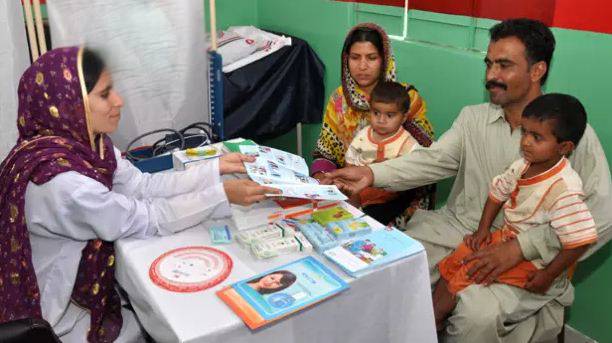Samia* was married off at a very young age. Her husband worked at a brick kiln. Despite working several jobs, her husband was incapable to support his growing family. Samia started working alongside him on a farm in an effort to feed her children.
During her marriage, she gave birth to seven girls. Pressured by her husband and in-laws to produce a son, she once again became pregnant. Frequent and closely-spaced pregnancies, though, took a toll on her health and the village midwife warned the family that Samia should not continue the pregnancy as it would endanger her health and the health of her fetus.
Paying no heed to the warning, Samia’s in-laws forced her to continue the pregnancy. Shortly after giving birth to her eighth child – a stillborn boy – Samia passed away.
Sadly, Samia’s case is not unusual. According to the report ‘State of Family Planning in Pakistan’, more than 80 women in Pakistan die each day due to preventable complications during pregnancy. The latest data confirms that the total fertility rate – or average number of children a woman would have if she survives all her childbearing years – remains high at 3.8, and is highest among women in rural areas and those with the lowest level of education.
Low mortality and high fertility sustained over a long period of time has serious implications for the structure, composition and distribution of population.
Pakistan is on the brink of a population explosion. With an estimated population of nearly 192 million, and a growth rate of 1.92 percent, Pakistan has become the sixth most populous country in the world. With the population growing at an alarming rate of two percent every year, it is likely that Pakistan’s population will reach 343 million people by 2050.
Considering the extreme pressures of over-population, what can be done to reduce the total fertility rate in Pakistan? And what can be done to prevent tragic and unnecessary deaths like Samia’s?
Improved access to quality healthcare that includes family planning counseling and services, antenatal and obstetric care, nutrition counseling and immunization services can easily save the lives of women such as Samia. Despite some progress in recent years on nutrition and immunization, accesses to family planning services and supplies have not been prioritised.
The provision of family planning services in Pakistan is hindered by many factors. These include illiteracy, poverty, religious barriers, poor access, traditional beliefs, misconceptions, lack of trained providers and poor coordination of health programmes.
Based on data shared by Population Council in its report on family planning, Pakistan has one of the lowest contraceptive prevalence rates in the region; out of 31 million married women of reproductive age in the country, less than 26.1 percent currently use modern contraceptives.
In Pakistan, the use of contraceptives is still considered a taboo topic. Despite maternal mortality rate of 276 deaths per 100,000 live births, next to nothing is being done to help women control their fertility rate. Most women don’t use a modern contraceptive method as their families mistakenly believe it is equivalent to abortion or leads to infertility. On the other hand, when it comes to men, people deem it forbidden to discuss birth control.
With the subject considered taboo, the society terms it a controversial matter that provokes vulgarity in sheer contradiction to injunction of their religion. All advertisements regarding preventive measures were stopped by the government regulatory body after viewers branded it immoral and unsavory to the nation’s social fabric.
Although the decision was soon revoked, PEMRA directed all electronic channels to avoid the airing of such advertisements during primetime.
Family planning is desperately needed in Pakistan due to the rapid increase in population and the resultant severe strains on economic resources, development and security. Family planning can curb population growth which, in turn, can contribute to sustainable social-economic development.
At the Family Planning London Summit in 2012, the government committed to working toward achieving universal access to reproductive health and raising the contraceptive prevalence rate to 55% by 2020. In order to achieve this, they must ensure the following:
First, voluntary and universal access to family planning is applicable to all, irrespective of their socio-economic status, gender, religion and marital status.
Second, young people, approximately 60% of the population in Pakistan, must be better informed and supported to exercise the right of family planning.
Third, innovation in family planning programme design, implementation and monitoring must be encouraged.
Certain pockets of non-governmental organizations like Family Planning Association of Pakistan – Rahnuma, Greenstar Social Marketing and Marie Stopes International have been making sustained contributions in providing family planning services as part of the community uplift programmes in their areas of operation.
According to statistics on the Greenstar website, during the past decade their initiatives have prevented approximately 11,000 maternal deaths, 127,000 child deaths, and a staggering 8 million unintended pregnancies.
But these figures dwarf when compared to the needs of nearly 31 million married women of reproductive age in Pakistan. Unfortunately, these NGOs lack support from the government which has also been a major drawback when it comes to promoting the issue on a national level compared to other programmes i.e. HIV/AIDS, polio and dengue eradication.
In order for Pakistan to achieve its FP2020 objectives, sustained, bold and unequivocal leadership and commitment at all levels of government is needed.
Motherhood is considered a blessing for women, but if the woman dies during pregnancy there is no blessing to celebrate.
Pakistan has tremendous opportunity to regain its earlier momentum and achieve both immediate and long-term objectives related to family planning. It is evident that until and unless population growth is given its due attention, the country will continue to fall short in meeting the needs of its citizens.
* Names have been changed to protect privacy






